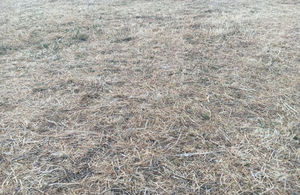Grass greener, but rain needed to reduce drought-risk for 2019
More than 300 dry-weather environmental incidents in summer 2018

Dry summer had significant impact on water supplies, agriculture, the environment and wildlife
- National Drought Group agrees action to reduce risk of drought in 2019
- More than 300 dry-weather environmental incidents this summer
- Water restrictions likely in spring 2019 if winter rainfall is below average.
The National Drought Group (NDG) met today (20 September) to assess the latest situation and agree actions needed to reduce the risk of water restrictions and protect the environment next year.
Members of the NDG, organisations affected by and responding to the risk of drought, heard that a number of water companies still have very low reservoir levels. The current environmental situation is fragile and dependent on good rainfall over the autumn and winter period.
The dry summer had a significant impact on water supplies, agriculture, the environment and wildlife, with the Environment Agency responding to 314 dry weather related incidents over summer – more than 3 times the usual amount.
Despite the recent rainfall, which has provided respite to rivers, wildlife and people’s lawns around the country, the water resources situation has not yet returned to normal. At the end of August, overall reservoir stocks were at 65 per cent. The NDG heard today that if winter rainfall is below average, water restrictions on water company customers are likely in spring 2019.
Following the dry summer, Sir James Bevan, Environment Agency Chief Executive, invited water company representatives back to the NDG to explain their plans to protect water supplies and the environment. Today, they outlined a range of steps to reduce the risk of restrictions and ensure good water supplies into next year. Water companies are working to reduce leakage, capture and store as much water as possible over winter, identifying new water sources, setting up water transfers between companies and other operational contingency measures.
The summer has been tough on farmers. The Environment Agency responded quickly providing help and assistance with speedy decisions on allowing more water to farmers through August by approving 88 changes to licences to help farmers get more water.
Efforts to conserve water and recent rain has helped to stabilise water levels, easing pressure on the environment and agricultural sector. But the full impact of the summer heatwave is yet to be felt, with a delay on damage to some species and crops. With very dry soils, especially in the south east of England, there may be a delay refilling groundwater aquifers and reservoirs over the coming months. A delay in recharge may mean we start spring 2019 with below average groundwater levels, increasing the risk of drought in the east and south east of England next summer.
Sir James Bevan, Environment Agency Chief Executive, who chaired the NDG meeting, reminding members that early action and proper planning will reduce the likelihood, or extent, of drought measures next year. He said:
Ensuring sufficient water for the public, the economy and the environment is one of biggest challenges we face as a country. The Environment Agency will continue to work actively with the water companies and other water users to seek to ensure that.
But this is not just a matter for the organisations at National Drought Group. We all use water, and everyone has a role to play in ensuring we continue to have reliable access to it, so we encourage everyone to please use water wisely.